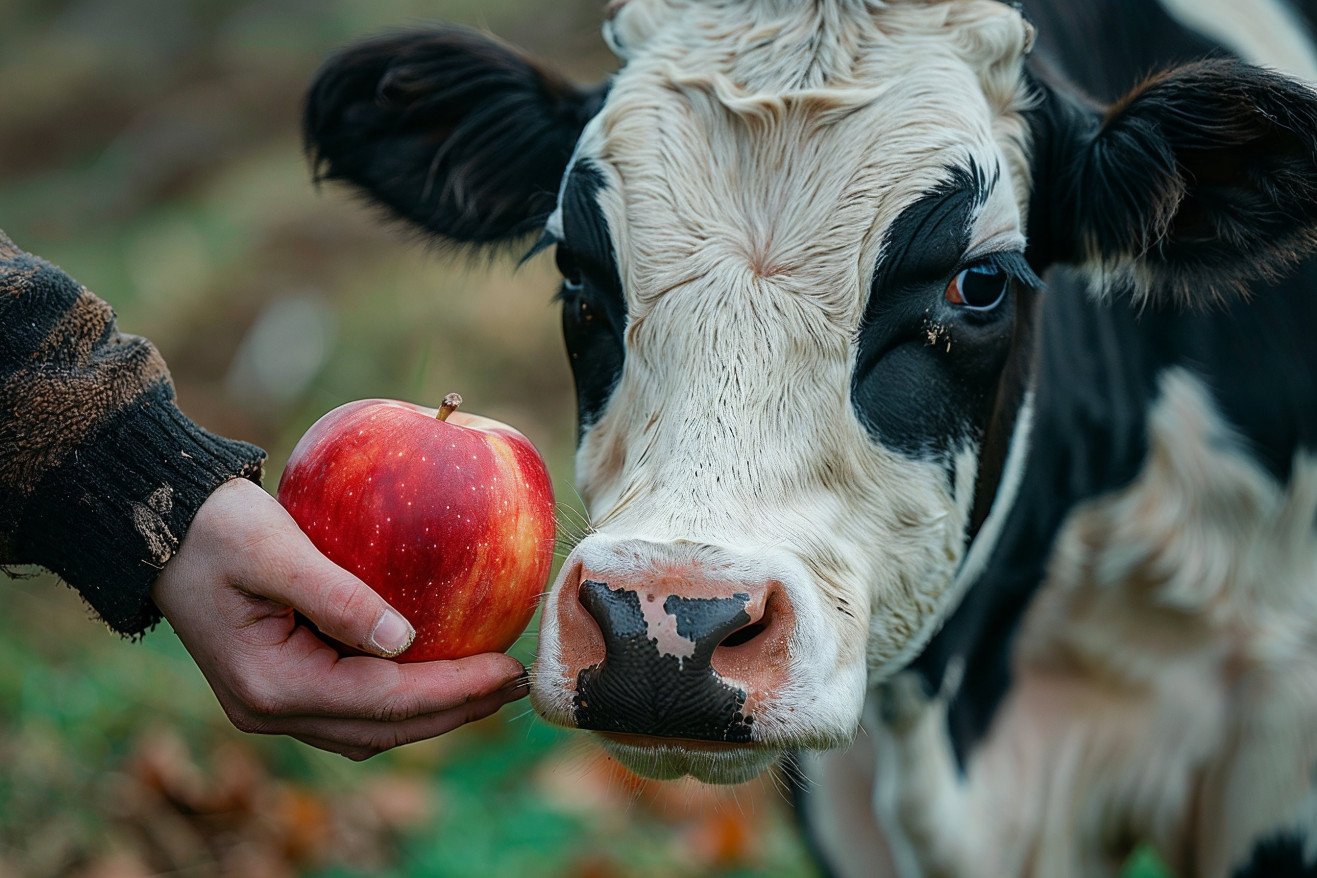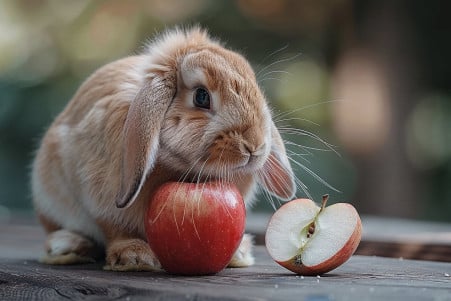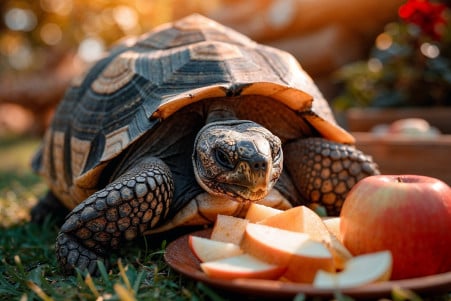Can You Feed Cows Apples? Here's What the Experts Say
31 March 2024 • Updated 29 March 2024

If you're a farmer or just someone who lives near cows, you may have asked yourself if you can feed cows apples as well as the grass and hay they typically eat. While cows can eat apples without any major health concerns, they should be fed sparingly because of their high sugar content, which can cause digestive problems and even obesity in cows if they're consumed in excess.
To better understand cows' ability to eat apples and other foods that aren't part of their normal diet, we've taken a look at nutritional studies and referenced agricultural experts and veterinarians. Their feedback will help you understand how to feed cows apples and other fruits in a way that's healthy for them, including in controlled amounts as a supplement to their regular diet.
Can cows eat apples?
Nutritional Benefits of Apples for Cows
Apples have a number of nutritional properties that make them a useful supplement for cows, especially dairy cows. According to a study from Michigan State University, the total digestible nutrients in apples are 69.7, which is close to corn at 90.0. This means apples can be used as a high-energy treat or even to replace some corn in a cow's diet.
Dried apple pomace, which is made up of the skin, pulp, and seeds from apple processing, has also been shown to be a valuable feed for cows. In a study published in Agriculture, adding 150g of dried apple pomace per kg of dry matter to a dairy cow's diet increased dry matter intake, milk yield, nutrient digestibility, and the production of beneficial volatile fatty acids in the rumen.
In addition to being fermentable carbohydrates, apples are also high in fiber and pectin, which can help support healthy rumen function and digestion, according to a study cited by PMC. Meanwhile, the antioxidant polyphenols that are abundant in apples may help cows by changing the rumen microbes and enzymes that are involved in oxidative stress. In the same study cited by PMC, dried apple pomace was shown to change the antioxidant capacity and fermentation in the rumen fluid of cows.
Dangers and Downsides of Feeding Cattle Too Many Apples
Feeding cattle too many apples can lead to a condition called apple acidosis. According to Ag Proud, symptoms of apple acidosis include depression, diarrhea, dehydration, and tachycardia. In the worst cases, the animals that develop apple acidosis may need to be euthanized, which can be a costly result for farmers.
In addition, apple seeds and cores contain amygdalin, which can produce cyanide when it's metabolized in the body in high doses, according to Medical News Today. Although it's unlikely that eating a few seeds will cause any problems, it's best to avoid the potential danger of cyanide toxicity by not allowing cattle to eat whole apples.
To avoid these downsides and keep cattle safe, it's important to make sure that you're feeding them apples in the right way and under the right circumstances, which we'll cover in the next section.
Safe Feeding Practices and Considerations
In order to safely feed apples to cows, it's important to adhere to safe feeding practices and considerations. For example, one farmer on Keeping A Family Cow notes that they feed their cows about 7 small apples a day as a treat, and they also recommend cutting or stomping on the apples before feeding them to the cows to avoid any choking hazards.
According to Feed Strategy, ruminants like cows can be fed relatively large amounts of fresh or wet apple pomace, which is a byproduct of apple processing. However, they note that apple pomace fed as silage can ferment and produce alcohol, which can be harmful to cattle if consumed in large quantities.
As a result, it's important to introduce apples into a cow's diet slowly and monitor the cows for any signs of digestive issues or other problems. Additionally, farmers can freeze or preserve apples to use as a supplement during the winter when fresh apples may be less available.
By adhering to these safe feeding practices and considerations, farmers can ensure that their cows can enjoy the nutritional benefits of apples as a treat without putting their health at risk.
Choosing the Right Apple Varieties for Cattle
Heirloom and disease-resistant apple varieties can be good options for cattle feed. According to NC State Extension, some things to think about when choosing apple varieties are when they ripen, what you want to use them for, and how resistant they are to diseases. For example, early season apples like Dayton, Pristine, and Redfree are all good options for snack apples for cattle.
Hoch Orchard & Gardens explains that Dayton is a tart, crisp apple that's similar to Granny Smith, while Pristine and Redfree are sweet, low-acid apples that are great for fresh eating. Meanwhile, cider or sauce apples with a higher sugar content could also be good options for cattle.
Growing your own organic apples can be a great way to ensure that you have a consistent and cost-effective source of supplemental cattle feed. As explained on Permies, some farmers have even planted "wild" or gleaned apples directly in beds on their property to create a forage area for their cattle and pigs. This can help keep costs down and ensure that there's always a fresh supply of fruit available.
With careful consideration of disease resistance and apple quality, farmers can find the right apple varieties to feed their cattle while also promoting sustainable, organic farming on their property.
Conclusion: Moderation is Key for Feeding Apples to Cattle
While cattle can eat apples in moderation, it’s important to be mindful of portion sizes and potential risks. Apples can be a valuable source of nutrients and energy for cattle, but overeating can lead to acidosis.
By following proper feeding recommendations, introducing apples to cattle’s diets slowly, and monitoring cattle for any signs of digestive upset, farmers can use apples as a nutritious and sustainable source of supplemental feed.
Farmers can also consult with veterinarians or other agricultural professionals to get personalized advice on feeding apples to cattle to ensure their safety and well-being.


